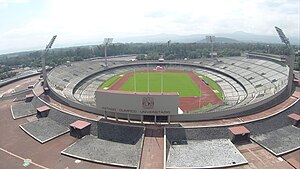1968 Summer Olympics / Athletics - 50 km walk (men)
|
|
|||||||||

|
|||||||||
| sport | athletics | ||||||||
| discipline | 50 km walk | ||||||||
| gender | Men | ||||||||
| Attendees | 36 athletes from 19 countries | ||||||||
| Competition location |
Estadio Olímpico Universitario (destination) |
||||||||
| Competition phase | 17th October 1968 | ||||||||
|
|||||||||
The men's 50 km walk at the 1968 Olympic Games in Mexico City was held on October 17, 1968. 36 athletes took part. The destination was the Estadio Olímpico Universitario .
Olympic champion was Christoph Höhne from the GDR. He won ahead of the Hungarian Antal Kiss and the American Larry Young .
In addition to Olympic champion Höhne, two other walkers from the GDR - officially East Germany - took part. Peter Selzer finished fourth, while Burkhard Leuschke had to give up the race. For the Federal Republic of Germany - officially Germany - Horst-Rüdiger Magnor (11th place), Gerhard Weidner (14th place) and Bernhard Nermerich , who was disqualified, took part.
Switzerland was represented by Erwin Stütz, who reached the goal in 20th place.
Walkers from Austria and Liechtenstein did not take part.
Existing records
| World best | 3:55:36 h |
Gennady Agapov ( Soviet Union )
|
Alma Ata , Soviet Union (now Kazakhstan ) | October 17, 1965 |
| Olympic record | 4:11:12 h |
Abdon Pamich ( Italy )
|
50km walk from Tokyo , Japan | October 18, 1964 |
World records are not set in street walking because of the different track conditions.
Conducting the competition
The athletes competed on October 17 at 2 p.m. ( UTC −6). There were no qualifying rounds.
Result
Date: October 17, 1968, 2 p.m.
The race was dominated by tempo changes and battles for positions until half time. In the top group were for a long time the Briton Paul Nihill, the owner of world record Gennadij Agapow, USSR, his compatriot Sergei Grigorjew, Christoph Höhne from the GDR and the German Bernhard Nermerich. The pursuers included the Hungarian Antal Kiss and Peter Selzer, GDR.
At 25 km Nihill and Höhne were alone in front. Over the next few kilometers, Höhne increased the pace sharply, nobody was able to follow him. Agapow, Nihill, and Kiss formed the first chase group. Shortly afterwards, the 1964 Olympic champion Abdon Pamich from Italy gave up the race. Agapow and Nihill also finished the competition a few kilometers later. At that time, around 40 km, Höhne had established a lead of over seven minutes. He was followed by the Hungarian Kiss. The US walker Larry Young had divided the competition very well and worked his way up to third place, another 48 seconds behind Antal Kiss. Nothing in this order changed until the finish line. Höhne won the gold medal with a comfortable lead of more than ten minutes. The East German Peter Selzer came fourth and the Swede Stig Lindberg came fifth ahead of the Italian Vittorio Visini.
Christoph Höhne won the first Olympic victory in athletics for the GDR.
Larry Young won the first US medal in this discipline.
| Split times | |||
|---|---|---|---|
| Intermediate mark |
Meanwhile | Leading | 5 km time |
| 5 km | 25:13 min | Höhne, Lindberg, Leuschke, Selzer, Grigoryev, Visini | 25:13 min |
| 10 km | 50:58 min | Nermerich, Nihill, Höhne, Grigoryev, Selzer, Delerue, Agapow, Gardiner | 25:45 min |
| 15 km | 1:17:25 h | Nihill, Agapow, Grigoryev, Höhne | 26:27 min |
| 20 km | 1:43:51 h | Nihill, Agapow, Grigoryev, Höhne | 26:34 min |
| 25 km | 2:10:28 h | Paul Nihill, Christoph Höhne | 26:37 min |
| 30 km | 2:35:57 h | Christoph Höhne | 25:29 min |
| 35 km | 3:00:24 h | Christoph Höhne | 24:27 min |
| 40 km | 3:26:14 h | Christoph Höhne | 25:50 min |
| 45 km | 3:52:58 h | Christoph Höhne | 26:44 min |
| 50 km | 4:20:14 h | Christoph Höhne | 27:17 min |
literature
- Ekkehard zur Megede , The History of Olympic Athletics, Volume 2: 1948–1968, Verlag Bartels & Wernitz KG, Berlin, 1st edition 1969, p. 356
Video
- ATLETICA OLIMPIADI 1968 MARCIA 50 KM HOHNE DDR , published on November 13, 2015 on youtube.com, accessed on November 7, 2017
Web links
- SportsReference 50km Walk , accessed November 7, 2017
- Official report - summary p. 112f, English / French. (PDF), accessed on November 7, 2017
- Official report of the Olympic Games 1968 p. 533, English / French. (PDF), accessed on November 7, 2017
Individual evidence
- ↑ IAAF Statistics Handbook, Berlin 2009 Page 566 (Engl.) ( Memento of 29 June 2011 at the Internet Archive ), accessed on November 7, 2017
- ↑ Official report of the 1968 Olympic Games ( Memento of the original from September 17, 2018 in the Internet Archive ) Info: The archive link has been inserted automatically and has not yet been checked. Please check the original and archive link according to the instructions and then remove this notice. P. 10, English / French (PDF), accessed on November 7, 2017
- ↑ Official report of the 1968 Olympic Games ( Memento of the original from September 17, 2018 in the Internet Archive ) Info: The archive link has been inserted automatically and has not yet been checked. Please check the original and archive link according to the instructions and then remove this notice. P. 533, engl./frz. (PDF), accessed on November 7, 2017
- ↑ SportsReference , accessed November 7, 2017